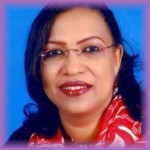| OMUWA ANDREW-UPONI (LLB(Hons) LLM UNIBEN) |
|---|

Supervisor(s): Prof Waheeda Amien and A/Prof Debbie Collier Contact details: omuwa.andrew-uponi@uniben.edu, andomu001@myuct.ac.za Description of research: Omuwa's research is focused on employment discrimination as one of the major barriers to the right of women with disabilities (WWDs) to earn a decent livelihood as a means of social inclusion in Nigeria. Although men and women with disabilities generally experience this barrier, men with disabilities are almost twice as likely to access formal employment than WWDs. WWDs are mostly seen to remain at home, run very small-scale businesses or beg in the streets as a sure means to survive daily. They, as humans, deserve to enjoy equality on all levels including employment because the right to earn a decent living and secure financial independence is a guaranteed human right unfettered by any form of discrimination due to gender, disability or any other factors. The thesis attempts a critical examination of the existing regulatory and institutional labour framework in Nigeria as it affects the employment rights of women with physical and visual disabilities. It will further explore the possibility of a hybrid regulatory strategy and implementation machinery to ensure the equal employment rights of WWDs in the open labour market and the public service as a tool for their social inclusion. |
| CHANDA CHUNGU (LLB LLM UCT MSc candidate Oxon) |

Name of Supervisors: Prof Danwood Chirwa and Prof Hugh Corder Contact details: cjchungu@gmail.com Description of research: The constitutional principle of legality was developed by the South African court to review conduct of the executive branch of government that falls short of administrative action. The recent and often haphazard development of the manner in which executive conduct has been judicially reviewed by the courts has caused some confusion with regards to how the principle ought to apply due to several inconsistencies in its application. This thesis therefore maps the origins of judicial review of executive conduct to how it has developed and outlining how the expansive principle of legality should be applied going forward. The thesis will propose clear and succinct guidelines on how executive conduct should be reviewed, the appropriate standard that should attach and how far judicial control can go. |
| SHARNA-LEE CLARKE (LLB LLM UWC) |

Supervisor: Prof Danwood Chirwa Contact details: sharnacay@gmail.com Description of research: Family law has evolved and changed significantly in South Africa and internationally over the years. However, our family related dispute resolution mechanisms are slow to change. Courts and other dispute resolution mechanisms require re-imagining, in the ways in which the best interests of the child are protected and implemented in family related legal disputes. Therefore, it is important to determine the extent to which the principle of the best interests of the child is protected in South Africa and ways in which to enhance and further provide for the protection of the best interests of the child. The research does this by examining and analysing the international children’s rights encompassed by the principle of the best interests of the child, such as the child’s participation rights. Thereafter, the research determines the application of international children’s rights in South Africa and the current methods of dispute resolution in family related legal disputes. This is done with a view to evaluate the proposal of a specialised family law paralegal in South Africa, to ensure the implementation of the best interests of the child in family related legal disputes more efficiently. The research intends to develop a concise role for a specialised paralegal that is appropriate to South African family related legal disputes. This is done by evaluating the need and scope of the specialised paralegal to promote and protect the best interests of the child in, among others, marriage and divorce; in the resolution of parental disputes; in instances of abuse and neglect of the child; and in disputes regarding the gender and homosexuality of children. |
|
ANNEKE EICHSTEDT (BA Sociology Bremen MPhil UCT) |

Supervisor: A/Prof Kelley Moult Contact details: anneke.eichstedt@web.de Description of research: Anneke’s research focuses on the decision-making process of adolescent survivors of sexual violence contemplating to report their victimisation to the South African Police Service. Crime reporting is referred to as the trigger event for the entire criminal justice system and non-reporting choices have profound consequences for the individual survivor and crime prevention/control efforts. Given that children and young women account for the majority of rape cases within the criminal justice system, further research into this important but understudied area of sexual violence service provision is required. Anneke is planning to conduct interviews with adolescent rape survivors, informal supporters and key informants working within the legal field. |
| INGRID HOLM (LLB LLM Lund University) |

Supervisor: Prof Danwood Chirwa Contact details: Description of research: Ingrid’s thesis focuses on the issue of duress in the commission of international crimes, and how this defence plays a part in the refugee status determination assessment. The research highlights the exclusion mechanism in the international refugee law regime and how exclusion marks the intersection between rights and punishment. Furthermore, the availability of defences to exclusion triggers questions regarding the increasingly blurred line between victim and perpetrator in highly coercive environments such as territories of conflict. The interrogation the current approach to refugee exclusion and the possibility for refugee claimants to raise the defence of duress in the exclusion assessment is important because of a gap in doctrine, and perhaps more importantly, the global political climate surrounding refugee law.
|
| HELLEN SHIRO MOGENI |

Supervisor: A/Prof Kelley Moult Contact details: hmogeni@yahoo.com Description of Research: The study recognizes that cases of defilement are increasingly being adjudicated by the court, available research illustrates feeble management of DNA evidence characterized by poor collection methods, inappropriate preservation and storage facilities, lack of standardized format for analysis, documentation and translation of evidence. The inefficiency has led to a huge backlog of cases, low prosecution rates, delayed and compromised justices for victims of defilement and wrongful identification of perpetrators. The study intends to explore the use of forensic DNA evidence in resolving cases of defilement. |
| GRACE MOYO (LLB Rhodes LLM UCT) |

Supervisor: Prof Dee Smythe Contact details: MYXGRA004@myuct.ac.za Description of research: Grace’s research focuses on disciplinary tribunal processes for sexual offences in South African universities. It seeks to ask and answer how we can formulate disciplinary processes so that they are victim friendly, regulated, yield more just outcomes, and are cognisant of the complex socio-legal display of power that characterizes sexual violence. |
| TSHEPISO SETH NDZINGE-MAKHAMISA (LLB University of Botswana LLM UP) |

Supervisor: Prof Danwood Chirwa Contact details: ndzingemakhamisa@gmail.com Description of research: The research tackles the issue of the implementation of key socio-economic rights within Botswana's disability landscape. The research tests Botswana's disability framework, with respect to these key rights against existing disability models and international conventions. The key question the research seeks to answer is whether Botswana is fulfilling its obligations with respect to the protection, fulfillment, enforcement and promotion of socio economic rights for persons with disabilities. |
| CHIPO MUSHOTA NKHATA (LLB UNZA LLM UCT) |

Supervisor: Prof Waheeda Amien Contact Details: chiponkhata@gmail.com Description of Research: Chipo’s research is stirred by the many challenges women prisoners in Zambia experience in accessing healthcare goods and services and consequential violations of their rights to health. The Zambia Correctional Services health care system determines prisoners’ health and the extent to which they enjoy their right to health. The healthcare system and regulatory system applicable to prison settings in Zambia determine how various social and economic positions of prisoners, such as gender, age, disability, social origins, geographical location and economic stability impact on prisoners’ health. Although all prisoners in Zambian correctional facilities experience challenges in accessing healthcare goods and services, women prisoners are disproportionately affected. At the core of the challenges experienced by women prisoners are the existence of a prisons health system that perpetuates vulnerability to health risks and consequent violation of their right to health and a regulatory framework that does not adequately respond to the unique needs of women prisoners. The aim of Chipo’s research is thus two pronged: i. To examine the role of participation of women prisoners in decision-making to enhance their enjoyment of their right to health; and ii. To examine how the Zambian regulatory framework can effectively guarantee such participation. |
|
NERIDA NTHAMBURI (LLB University of Nairobi LLM UCT) |

Supervisor: Prof Hugh Corder Contact details: nnthamburi@gmail.com Description of research: Nerida’s thesis examines ways in which gender makes a difference in the way judiciaries work and should work. The oft-repeated sentiment is that ‘justice is blind’- does this also mean justice is gender-blind? This thesis will analyse various structural and institutional barriers to women’s appointment and access to judicial careers in judiciaries in Kenya and Uganda. Gender equality is increasingly recognized as a fundamental component of a well-functioning and modern judicial system. Through the use of well-researched case studies and recommendations, Nerida hopes to contribute towards the quality and efficiency of judicial systems in Kenya and Uganda through highlighting the importance of gender equality and diverse representation in judiciaries. This research is premised on the sociology of law, to determine how engendering the judicial system contributes to a more responsive and representative government. |
|
RONALD ALLAMANO ONG’UDI (LLB(Hons) Moi PGDip Kenya School of Law LLM Deakin, Australia) |

Supervisor: A/Prof Cathleen Powell Contact details: ronongudi@gmail.com Description of research: Ronald’s research reviews the application of the political question doctrine with a specific focus on Kenya, South Africa and the United States. The research proceeds from the understanding that political questions are by their very nature non-justiciable. This view is embodied in the classical exposition of the doctrine. By affirming the political question doctrine, courts allow political actors the “jurisdiction” to resolve political questions with a measure of finality. Ronald’s research departs from the traditional application of the doctrine by advocating for the justiciability of political questions that bear a nexus to a fundamental right and freedom. |
|
GHADA AWAD M. SHAWGI (LLB(Hons) University of Khartoum LLM Queen’s University of Belfast) |

Supervisor: Prof Waheeda Amien Contact details: ghadaa.shawgi@gmail.com Description of research: Sudan is one of the African countries that witnesses prolong civil war and conflict since its independence. The issue of accommodation of cultural and ethnic diversity is a prominent root cause of Sudan conflicts. The thesis is attempting to explore the scope of the international framework of accommodation of diversity and minority rights and to investigate to what extent the Sudan constitution is complying with it. The research aims to recommend the key features of a constitutional model tailored for Sudan that based on equal citizenship rights and protection of minority cultures. |
| FAITH TUNDE-YARA (LLB OAU LLM UCT) |

Supervisors: Adj Prof. Mark Shaw and Prof Elrena van der Spuy Description of research: Faith’s doctoral research seeks to explore the incidences of organ trafficking in Africa, the involvement of Africans in the global organ trade both as organ sellers and buyers, and the policy issues around a proper regulation of organ transplant systems in Africa, which could serve as a contributing factor to the occurrence and growth of illicit organ trade. It seeks to answer the core question of the extent to which the illegal organ trade and organ trafficking is a problem in Africa. She considers the research to be of utmost importance at this time because organ trafficking is one of the least profiled forms of human trafficking, particularly in Africa. The research seeks to explore the variations of organ trafficking as it obtains in Africa ; variations such as cases of kidnapping for the removal of body parts, use of body parts for vodoo or African traditional medicine, lack of transplant technologies contributing to the exploitation of people’s organs in Africa, and so on. It also seeks to analyse the exploitation of migrant population in the global organ market and more particularly, in Africa. |
| ZUZANA VRBOVA (Mgr. Charles University, Prague) |

Thesis title:Transfer of Environmentally Sound Technologies in the Context of the International Climate Change Regime and Intellectual Property Law Supervisors: Emer.Prof Jan Glazewski and A/Prof Tobias Schonwetter Contact details: ZVrbova19@gmail.com Description of research: Zuzana’s research is focused on the issue of an effective transfer of environmentally sound technologies which was recognized as crucial when tackling the climate change. She asks these research questions: What is the relationship between the transfer of environmentally sound technologies and intellectual property law, and what possible adjustments to the international intellectual property law framework or other legal tools facilitating the transfer could be made in order to make environmental technologies more easily available? |